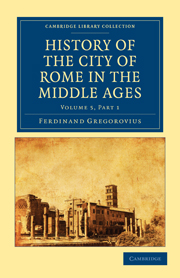CHAPTER II
Published online by Cambridge University Press: 04 April 2011
Summary
While at war with the Roman commune, Innocent III. was deeply involved in the affairs of the political world, which had constituted him arbitrator of Europe. Other histories describe these affairs; the quarrel for the German throne and the affairs of the kingdom of Sicily, which henceforward became of the highest importance for the empire, the Papacy, and Italy, alone concern the history of the city.
The widow of Henry VI. found herself defenceless against the storms which broke over Sicily after the Emperor's death. She had her son (a boy of three) crowned in Palermo on May 17, 1197, but the heir of a hated conqueror had but little prospect of ruling the kingdom at a later date. The Sicilians rose in just national hatred against the Germans, who could not appear otherwise than as oppressors of their country, which under Norman laws had prospered in wealth, industry, and noble arts. The temperate Southerners were disgusted by the excesses of the common soldiers and by the unbridled greed of rude squires and knights, who regarded the wealthy island as a paradise in their quest of fortune. A classically educated Norman, a historian who combined seriousness with poetic fire, gave vent to the national feeling of Sicily on the fall of the Norman dynasty in a passionate outburst. The patriots raised the cry, “Down with the foreigners.” Sicilian Vespers threatened.
- Type
- Chapter
- Information
- History of the City of Rome in the Middle Ages , pp. 50 - 95Publisher: Cambridge University PressPrint publication year: 2010First published in: 1897

